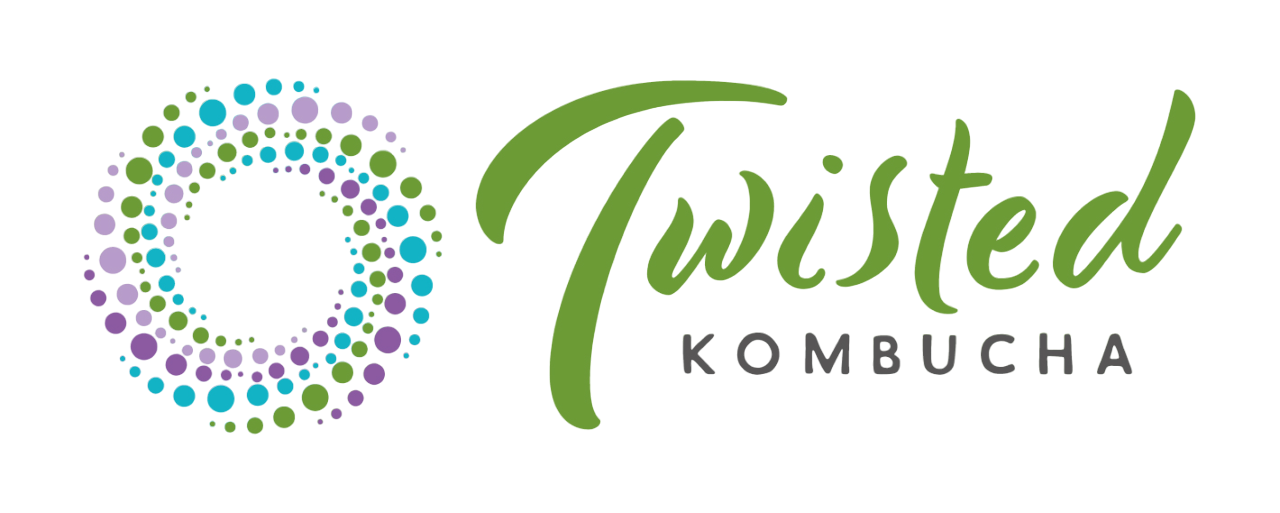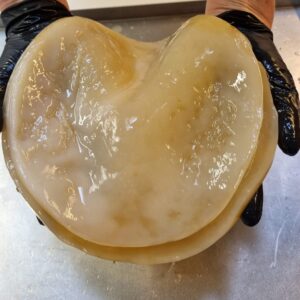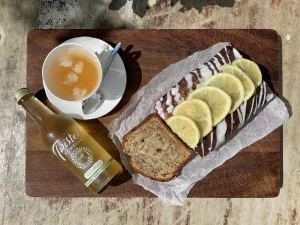
Hey there, lovely readers! I’m Lou, and today I’m excited to spill the tea – well, not just any tea, but the probiotic powerhouse that is kombucha. It’s been making waves in the UK and around the world for its potential health benefits. But let’s step away from the hype and dive deep into what truly makes kombucha special: the incredible probiotics it contains.
Before we get into the nitty-gritty of kombucha’s probiotics, let’s chat about the difference between probiotics and prebiotics. You see, understanding the power of these little microbes and how they interact with your body is the key to unlocking the benefits of kombucha.
So, brew yourself a cup of your favorite tea (or maybe even a glass of Twisted Kombucha if you’re already a fan), and let’s explore the marvelous world of probiotics in this fizzy, tangy, and gut-loving drink.
Probiotic vs. Prebiotic
Before we delve into the probiotics in kombucha, let’s quickly distinguish between probiotics and prebiotics. While they sound similar, they play different roles in your digestive health.
Probiotics are live bacteria that are beneficial for your gut health. They help maintain a harmonious balance of microorganisms in your intestines, aiding digestion and supporting your immune system. Essentially, they are the friendly microbes that keep your gut in check.
On the other hand, prebiotics are non-digestible fibers that serve as food for these probiotics. They provide the necessary sustenance for the good bacteria to flourish, which is equally crucial for your gut health. Now, let’s get back to the stars of the show – the probiotics in kombucha.
Why Do We Need Probiotics?
Probiotics have become a buzzword in the world of health and wellness, and for a good reason. These tiny microorganisms, often found in various foods and supplements, have a significant impact on our overall health. But why do we need probiotics? Let’s delve into the reasons that make these beneficial bacteria an essential component of a healthy lifestyle.
- Gut Health: The human digestive system is a marvel of complexity, teeming with a diverse community of microorganisms. Probiotics, often referred to as “good” bacteria, are integral to this ecosystem. They help maintain a balanced and harmonious environment in your gut. When this balance is disrupted, it can lead to digestive issues like irritable bowel syndrome (IBS), constipation, diarrhea, and more. Probiotics work as the guardians of your gut, promoting optimal digestion.
- Immune Support: Your gut isn’t just a digestive hub; it also plays a pivotal role in your immune system. Probiotics contribute to the development and function of your immune cells. By maintaining a stable gut microbiome, probiotics help prevent harmful bacteria from gaining a foothold. A strong immune system is your body’s defense against infections and illnesses.
- Nutrient Absorption: Probiotics facilitate the absorption of essential nutrients, particularly minerals like calcium, magnesium, and iron. A healthy gut ensures that your body can effectively extract vital components from the foods you consume, promoting overall well-being.
- Mental Health: It might sound surprising, but there’s a profound connection between your gut and your brain. Probiotics play a role in this gut-brain axis by producing neurotransmitters and regulating inflammation. As a result, they can influence your mental well-being and potentially help with conditions like anxiety and depression.
- Managing Inflammation: Chronic inflammation is a root cause of numerous health issues, from autoimmune diseases to cancer. Probiotics help maintain a state of balance in your gut, which in turn supports the regulation of inflammation throughout your body.
- Skin Health: Problems like acne, eczema, and psoriasis can sometimes be linked to gut imbalances. By promoting a healthy gut, probiotics might aid in alleviating these skin conditions.
- Heart Health: Some probiotic strains have shown promise in reducing risk factors for heart disease. They can assist in managing cholesterol levels and blood pressure.
- Allergies: Early exposure to specific probiotics can influence the development of allergies in children, potentially reducing the risk of allergies later in life.
What Probiotics Are In Kombucha?
Kombucha is a powerhouse of probiotics, with over 50 different types thriving in this effervescence. Since it would be hard to explain each and every one in one blog alone, let’s take a look at a selected few for now:
- Lactobacillus: Often referred to as the “friendly bacteria,” Lactobacillus is a real MVP when it comes to gut health. It thrives in the acidic environment of kombucha, making it an ideal companion in maintaining a balanced gut microbiome. Lactobacillus specializes in breaking down various food components and absorbing essential nutrients. So, when you’re sipping on kombucha, you’re inviting this probiotic powerhouse to support your digestion.
- Bifidobacterium: This probiotic strain is celebrated for its immune-boosting abilities. By inhabiting your intestines, Bifidobacterium helps keep harmful pathogens at bay while promoting overall gut health. It’s known to reduce inflammation, which is a key factor in several digestive issues. If you’re looking for an ally to fortify your gut’s defenses, Bifidobacterium in kombucha has got your back.
- Acetobacter: This unique member of the kombucha microbial community is a star of the fermentation show. Acetobacter’s primary role is to convert alcohol into acetic acid, a process that contributes to kombucha’s distinctive tangy flavor. So, while it doesn’t play a direct role in your gut health, it’s the reason behind kombucha’s delightful taste.
- Saccharomyces boulardii: Although not a bacterium but a yeast, Saccharomyces boulardii is an honorary probiotic. It’s often included in probiotic lists because of its gut-supporting properties. This yeast strain helps in maintaining a harmonious gut flora and has been particularly useful for individuals dealing with digestive concerns. If your tummy’s been a little unsettled, Saccharomyces boulardii is here to bring balance.
- Pediococcus: Kombucha’s rich flavor profile owes much to Pediococcus. This probiotic strain contributes by producing lactic acid during fermentation, adding a unique depth to the beverage’s taste. As the lactic acid levels rise, it also enhances kombucha’s probiotic benefits, reinforcing your gut’s microbiome.
- Zygosaccharomyces: This yeast strain may not be as famous as some of its companions, but it plays a vital role. Zygosaccharomyces aids in the alcohol fermentation process, contributing to the precursor of acetic acid. It’s a team player in the complex symphony of kombucha production.
- Gluconacetobacter xylinus: Have you ever noticed that peculiar cellulose layer on top of your kombucha? That’s the work of Gluconacetobacter xylinus. It’s responsible for producing cellulose during fermentation, resulting in the formation of the scoby (symbiotic culture of bacteria and yeast). The scoby is at the heart of kombucha-making, and it’s where the magic happens.
- Escherichia: While the name might sound a bit daunting, a specific strain of Escherichia is a silent protector in kombucha. It plays a crucial role in maintaining the acidic environment, preventing harmful microbes from flourishing in your brew. This ensures your kombucha remains safe and delicious.
- Gluconobacter oxydans: Now, here’s another kombucha hero contributing to that wonderful tang. Gluconobacter oxydans is involved in the production of both acetic acid and gluconic acid. These acids not only add to kombucha’s unique flavor but also bolster its probiotic properties.
- Zygosaccharomyces kombuchaensis: This yeast strain is unique to kombucha and helps kickstart alcohol fermentation. It’s also responsible for contributing to the formation and vitality of the scoby. Without Zygosaccharomyces kombuchaensis, your kombucha would lack its signature zing.
Now that we’ve met some of the remarkable probiotics found in kombucha, you can appreciate why this drink is celebrated for its gut-loving benefits. The next time you take a sip, remember that you’re giving your body a dose of these incredible microorganisms, each playing a unique role in supporting your well-being.
What Makes Kombucha The Best Probiotic Drink in the UK?
The UK has embraced kombucha not just as a delicious beverage but as a powerful probiotic source. What sets kombucha apart is its natural fermentation process that encourages these probiotics to thrive. No need for pills or supplements – kombucha offers these beneficial bacteria in a tasty, fizzy, and easily digestible form. It’s like sipping your way to better gut health.
As kombucha has gained popularity, various flavors and brands have emerged in the UK market. This diversity not only adds to the enjoyment of the drink but also allows you to select kombuchas with specific probiotic profiles that align with your gut health goals.
Conclusion
Kombucha isn’t just a trendy beverage; it’s a probiotic powerhouse that’s been valued for centuries for its potential health benefits. The diverse range of probiotics in kombucha contributes to improved gut health and overall well-being, making it a valuable addition to your diet.
In a world where gut health is a top priority, kombucha is a natural, delicious, and easily accessible source of probiotics. So, why not raise a glass of Twisted Kombucha to better digestive health? Your gut will thank you for it.
FAQs
What is the mother bacteria for kombucha?
The “mother” in kombucha typically refers to the scoby, which stands for Symbiotic Culture of Bacteria and Yeast. The scoby is a gelatinous biofilm that forms during the fermentation process of kombucha. It’s composed of a variety of bacteria and yeast strains working together to ferment the tea and create the characteristic fizzy, tangy drink.
What is the main probiotic in kombucha?
Kombucha contains a wide array of probiotics, but it doesn’t have one main probiotic. Some of the common probiotic strains found in kombucha include Lactobacillus, Bifidobacterium, Saccharomyces boulardii, and more. These probiotics work together to provide the gut-health benefits associated with kombucha.
How many strains of probiotics are in kombucha?
Kombucha can contain over 50 different strains of probiotics. The exact number and types can vary based on the specific fermentation process and ingredients used. The diverse microbial community in kombucha contributes to its potential health benefits.
Does kombucha actually help gut bacteria?
Yes, kombucha has the potential to positively impact your gut bacteria. The probiotics in kombucha can help maintain a balanced and diverse gut microbiome, which is essential for good digestive health. They assist in breaking down food, absorbing nutrients, and maintaining a harmonious gut environment.
Does kombucha affect your bowels?
Kombucha can influence your bowel movements. Some people experience improved regularity and digestive comfort when consuming kombucha regularly. However, individual responses can vary, and excessive consumption may lead to digestive discomfort in some individuals. It’s essential to monitor how your body responds to kombucha.
Does kombucha cleanse your stomach?
Kombucha is sometimes associated with a “cleansing” effect on the digestive system, primarily due to its potential to support gut health. The probiotics in kombucha can help maintain a healthy gut microbiome and promote efficient digestion.














Its like you read my mind You appear to know so much about this like you wrote the book in it or something I think that you can do with a few pics to drive the message home a little bit but instead of that this is excellent blog A fantastic read Ill certainly be back